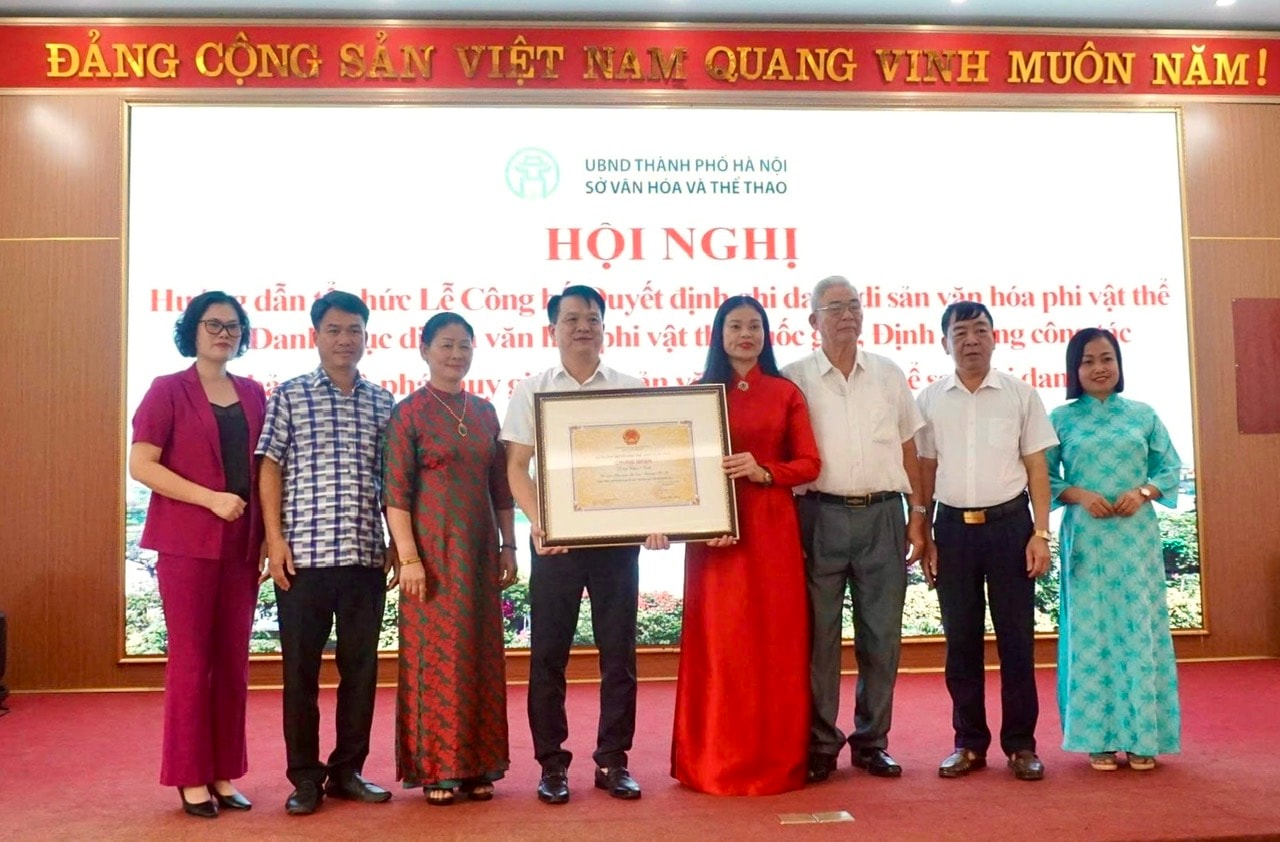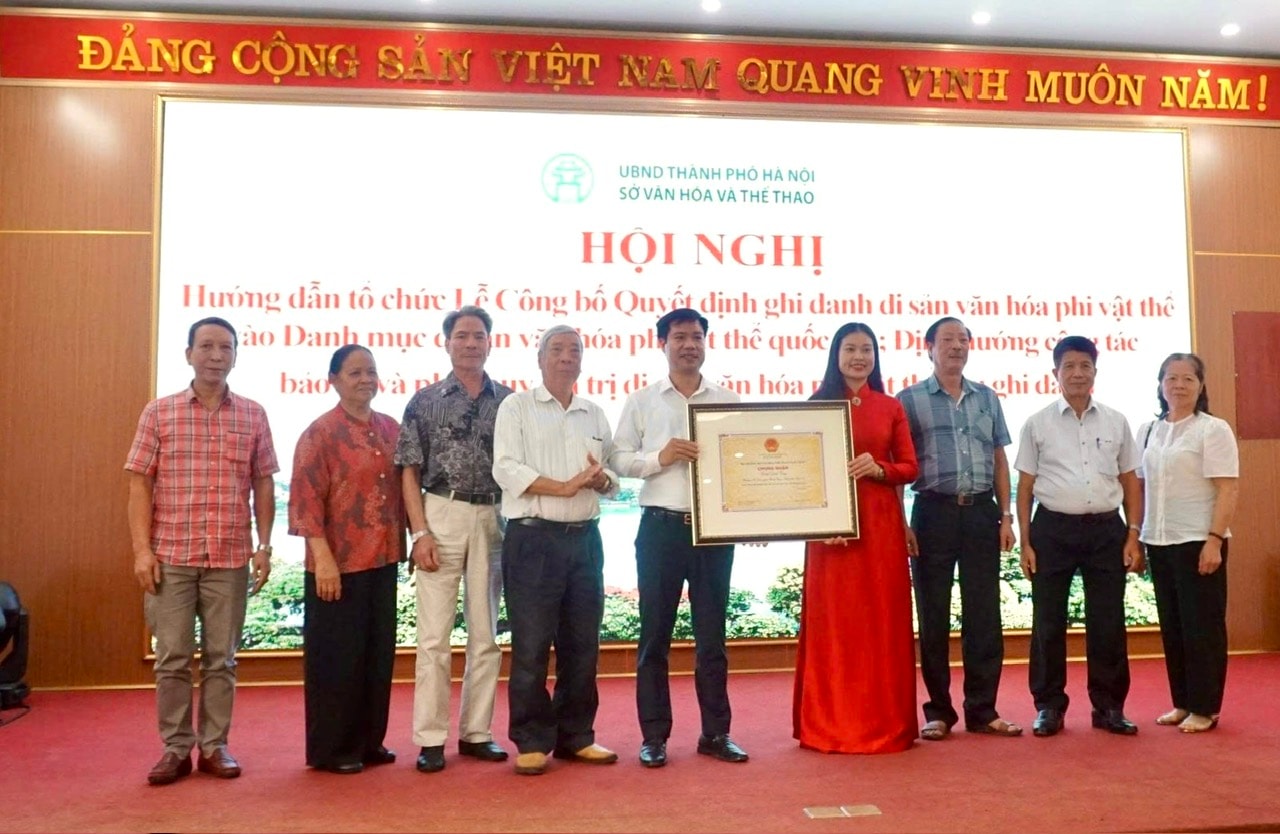Specifically, Hanoi now has six elements under the category of traditional festivals, one under the category of traditional handicrafts and folk knowledge, and one under the category of folk knowledge.

Delegates at the event.
The nine newly recognized heritage elements include: the Cheo Tau singing festival of Tong Goi (Tan Hoi Commune, Dan Phuong District – now O Dien Commune); the La Phu Village Festival (La Phu Commune, Hoai Duc District – now An Khanh Commune); the Dong But Pagoda Festival (Ngoc Lieu Commune, Quoc Oai District – now Kieu Phu Commune); the Nanh Pagoda Festival (Ninh Hiep Commune, Gia Lam District – now Phu Dong Commune); the Sai Temple Festival (Thuy Lam Commune, Dong Anh District – now Thu Lam Commune); the Vong Communal House Festival (Ha Dinh Ward, Thanh Xuan District – now Khuong Dinh Ward); the craft of Thanh Tri steamed rice rolls (Vinh Hung Ward); the knowledge of preparing and enjoying La Vong grilled fish (Hanoi); and the knowledge of preparing traditional feasts in Bat Trang (Bat Trang Commune).
Speaking at the conference, Director of the Hanoi Department of Culture and Sports, Bach Lien Huong, praised the dedication and contributions of local authorities and communities in preserving and promoting the intangible cultural values of festivals and traditional crafts within Hanoi's cultural heritage.
The Director also expressed the hope that the spirit of the conference discussions would spread widely among the people through local ceremonies that honor and celebrate these heritage elements. This would allow the community to fully appreciate the meaning, values, and significance of the nine elements newly added to the national list.

Director of the Hanoi Department of Culture and Sports Bach Lien Huong presents the Decision recognizing intangible cultural heritage elements as part of the National Intangible Cultural Heritage List to local representatives.
She emphasized that ceremonies recognizing intangible cultural heritage should be held with solemnity, thriftiness, and in accordance with regulations, while ensuring that the community can participate.
"Recognition is not only a joyful milestone for heritage but also an opportunity to promote culture and tourism in localities, bringing heritage closer to the public," said Huong.
However, it also places new demands on the management, safeguarding, and promotion of heritage values, ensuring that intangible cultural heritage continues to be practiced to guide people and communities towards good cultural values, preserve identity, and contribute to comprehensive social development, she continued.
Expressing his delight at the recognition of the Nanh Pagoda Festival (Phu Dong Commune) as a national intangible cultural heritage element, Deputy Chairman of Phu Dong Commune People's Committee Nguyen Dinh Quang shared that this was a great source of pride for the entire community of the former Ninh Hiep Commune and the new Phu Dong Commune.
The Nanh Pagoda Festival, practiced by the local community of Nanh Village, takes place annually from the fourth to the sixth day of the second lunar month.
Its distinct feature is a series of traditional rituals carried out with solemnity and symbolic meaning, such as the procession of spirits, the procession of Buddha and Saints, the six-offering ritual, and incense and flower offerings. Particularly notable are the rituals of raising ceremonial poles, erecting banners, and conducting ceremonial circumambulations.
"We pledge to continue managing, guiding the community in practicing, and further promoting the value of this recognized heritage. The commune will develop programs and plans to safeguard and enhance the intangible cultural heritage value of the Nanh Pagoda Festival," said Quang.
This includes intensifying promotion and introduction of the heritage, researching and documenting it systematically and creatively, strengthening heritage education and transmission within the community, restoring its components to maintain vitality, and integrating the festival with cultural-spiritual tourism and the creative industry," Quang said.
With the addition of nine new national intangible cultural heritage elements, Hanoi has reaffirmed its status as a locality rich in cultural heritage while also underscoring its responsibility to preserve and protect the nation's heritage.